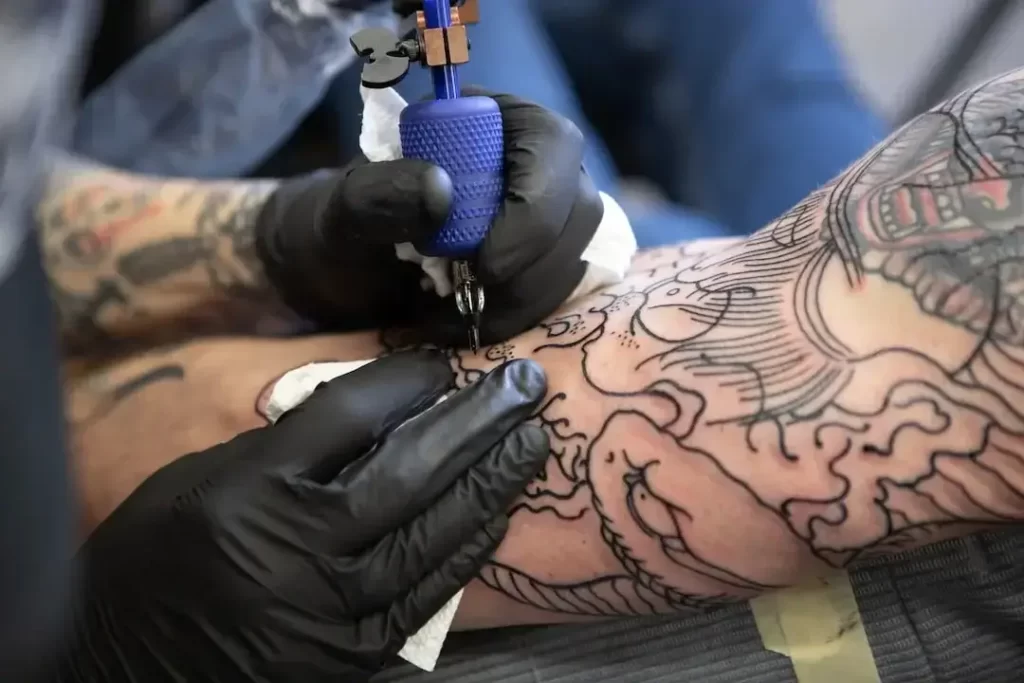Tattoos have long been a part of human culture, serving as expressions of identity, art, and even rebellion.
In recent years, their popularity has surged, with people from all walks of life adorning their bodies with intricate designs.
However, with the rise in tattooing, concerns have also grown about the potential health risks they pose. One of the more serious questions that have emerged is: Can tattoos cause blood cancer?
Also Read: How Long After A Tattoo Can I Have Surgery? Understanding The Essential Wait Period
What Are Tattoos?
Tattoos are permanent designs on the skin made by inserting ink, dyes, and pigments, either indelible or temporary, into the dermis layer of the skin.
This process alters the pigment of the skin, creating an image, text, or design.
Inks Used In Tattoos
The inks used in tattoos come in a wide range of colors, often containing various pigments and carriers.
These pigments can be derived from industrial sources, such as plastics, and might contain heavy metals like lead, cadmium, and chromium.
Carriers keep the ink evenly mixed and include substances like ethanol and glycerin.
Impact On The Skin
The process of tattooing involves repeatedly piercing the skin with tiny needles coated with ink.
This invasive process can cause trauma to the skin and lead to immediate reactions like swelling and redness.
More importantly, it introduces foreign substances into the body, which can have various effects.
Also Read: Do Blue Ink Tattoos Hold Up Well Over Time: The Ultimate Guide

Blood Cancer: An Overview
What Is Blood Cancer?
Blood cancer is a type of cancer that affects the blood, bone marrow, or lymphatic system.
It is characterized by the abnormal proliferation of blood cells, which can impede the body’s ability to fight infection and carry oxygen.
Blood cancers can be life-threatening, but treatment options have significantly improved over the years.
Types Of Blood Cancer
The primary types of blood cancer include:
- Leukemia: Cancer of the body’s blood-forming tissues, including the bone marrow and the lymphatic system. It leads to the overproduction of abnormal white blood cells.
- Lymphoma: This affects the lymphatic system, which removes excess fluids from the body and produces immune cells. Lymphocytes, a type of white blood cell, become cancerous and multiply uncontrollably.
- Myeloma: It targets plasma cells, a type of white blood cell in the bone marrow that helps fight infections. Myeloma disrupts the production of normal blood cells and weakens the immune system.
Also Read: Accidentally Ripped Off Tattoo Scab? Stay Calm And Follow These Steps
Common Causes And Risk Factors
Risk factors for blood cancer can include genetic predisposition, exposure to certain chemicals or radiation, smoking, and some viral infections.
However, the impact of lifestyle factors, including tattoos, is not as clear-cut and is still a subject of research and debate.
The Link Between Tattoos And Cancer Risk
Research Studies On Tattoos And Cancer Risk
Over the years, various research studies have sought to understand the relationship between tattoos and cancer risk.
While some of these studies have identified potentially carcinogenic compounds in tattoo inks, the direct link between tattoos and an increased risk of blood cancer remains largely unproven.
It’s crucial to differentiate between the presence of harmful substances in ink and the actual development of cancer.
Carcinogenic Compounds In Tattoo Inks
Tattoo inks can contain a range of compounds, some of which have raised health concerns.
Certain colors of ink are known to contain heavy metals like mercury, arsenic, and lead, all of which have carcinogenic properties.
However, the quantity present in tattoo inks is typically small, and the risk they pose is subject to ongoing research.
Body’s Reaction To Tattooing
When tattoo ink is injected into the skin, it’s recognized as a foreign substance by the body’s immune system.
The long-term effects of this immune response and the potential for it to trigger pathological changes, including cancerous developments, are areas of active research.
The body’s reaction can vary greatly from person to person, influenced by factors like the type of ink used, the extent of the tattoos, and individual immune responses.
Also Read: Expert Insights: Why Tattoo Lines Thicker After Healing Demystified
Regulatory Perspectives
Regulation Of Tattoo Inks Around The World
The regulation of tattoo inks varies significantly from country to country. In some regions, such as the European Union, tattoo inks are subject to stringent regulations and safety checks.
These regulations ensure that the inks used are free from certain harmful substances.
However, in other parts of the world, including some states in the United States, the regulation of tattoo inks is less strict or sometimes non-existent.
This lack of standardization raises concerns about the safety and quality of tattoo inks used.

Lack Of Regulation And Potential Risks
In places where there is a lack of regulation, the risks associated with tattoo inks increase.
Unregulated inks may contain harmful substances that are not approved for use on human skin.
These substances can potentially lead to allergic reactions, skin infections, and in the long term, could contribute to an increased risk of cancer.
Also Read: How Soon After Laparoscopic Surgery Can I Get A Tattoo
Role Of Health Organizations In Setting Standards
Health organizations, both national and international, play a crucial role in setting safety standards for tattoo inks.
Organizations like the U.S. Food and Drug Administration (FDA) and the European Chemicals Agency (ECHA) are involved in ongoing efforts to research the components of tattoo inks and establish guidelines to ensure their safety.
Their role is vital in protecting consumers from the potential risks associated with tattooing.
Case Studies And Research Findings About Can Tattoos Cause Blood Cancer
Recent research presented at the 2023 American Association for Cancer Research Annual Meeting has shed light on the potential association between tattooing exposures and the risk of hematologic cancers.
This study, conducted by the University of Utah and Boston University Chobanian & Avedisian School of Medicine, specifically aimed to evaluate the link between tattoo inks and hematologic malignancies.
A population-based case-control study was conducted, involving 156 myeloid neoplasms and 500 lymphomas.
The patients, aged 19 to 79 years, were diagnosed between July 2019 and December 2021 and identified through the Utah Cancer Registry using rapid case ascertainment.
Control participants, numbering around 19,000 adult residents of Utah, were selected from the 2020 Utah Behavioral Risk Factor Surveillance System statewide survey.
These controls were frequency matched to cases in a 3:1 ratio based on age, sex, race, and ethnicity.
Through telephone surveys, data was collected on the number of tattoo sessions, age at first tattoo, and relevant co-variates.
The study utilized both binary logistic regression models for general hematologic malignancies and multinomial logistic regression models for myeloid neoplasms and tattoos lymphoma cancer.
This was done to calculate odds ratios (OR) and 95% confidence intervals for each tattoo variable, adjusted for factors like education level, past cancer diagnosis, and whether the person ever smoked.
The findings indicated that there was no strong evidence that receiving a tattoo versus never having received one was associated with the risk of overall hematologic cancers (OR, 1.01; 95% CI, 0.96-1.07), myeloid neoplasms (OR, 1.12; 95% CI, 0.59-2.13), or lymphomas (OR, 1.07; 95% CI, 0.77-1.49).
However, having at least three large tattoos was suggestively associated with an increased risk of overall hematologic cancers (OR, 1.33; 95% CI, 0.69-2.47), particularly myeloid neoplasms (OR, 1.73; 95% CI, 0.54-5.50).
Furthermore, receiving a first tattoo before the age of 20 was associated with an elevated risk of myeloid neoplasms compared to those who never received a tattoo.
It’s important to note that some tattoo inks contain carcinogens that can interact with solar radiation to produce potentially toxic compounds.
Additionally, these inks can migrate to the lymphatic system, causing inflammatory and immune responses.
The study’s conclusion pointed towards a potential association between having several large tattoos and the risk of hematologic cancers, especially among those who received tattoos at a young age.
These findings could significantly inform public health messaging about the safety of tattoos.
Also Read: Can You Get A Tattoo On Accutane
Mitigating Risks
When considering getting a tattoo, it’s essential to understand how to mitigate potential health risks, particularly regarding the concerns about cancer.
First and foremost, choosing a reputable tattoo parlor and experienced artist is crucial.
These professionals should adhere to the highest standards of hygiene and safety, using sterilized equipment to prevent infections.
It’s equally important to inquire about the types of inks used. Opt for parlors that use regulated, high-quality tattoo inks known to be free from carcinogenic compounds.
As some inks can cause allergic reactions or interact with the body in harmful ways, understanding their composition can be crucial.
Furthermore, aftercare plays a significant role in ensuring a safe healing process. Following the artist’s instructions on how to care for your new tattoo can prevent complications.
This includes keeping the tattoo clean, avoiding direct sunlight, and monitoring for any signs of adverse reactions.
Lastly, staying informed about the latest research and guidelines on tattoo safety is advisable.
As new studies emerge and regulations evolve, staying updated can help make more informed decisions about tattoos.
Also Read: Calf Tattoo Hurts To Walk? Discover Proven Strategies For Pain-Free Steps
FAQs About Can Tattoos Give You Cancer
1. Can You Get A Tattoo If You Have Blood Cancer?
Getting a tattoo when you have blood cancer is a topic of concern for many. There is a potential infection risk associated with tattoos, especially for cancer patients with compromised immune systems. It’s essential to talk to your doctor if you’re considering getting a tattoo while dealing with health problems like blood cancer. They can provide guidance on whether it’s safe and when it might be the right time to get a tattoo. Raise this important discussion to ensure your well-being.
2. Can Tattoo Ink Cause Cancer?
The question of whether tattoo ink can cause cancer has been studied by researchers extensively. While there has been speculation about a possible link between tattoos and cancer, this association is often considered a myth as there’s no concrete evidence supporting the development of skin cancer directly from getting a tattoo. The risk of such a connection remains studied but not supported by scientific findings. Tattoo enthusiasts need not worry about the increase in cancer risk, according to current research.
3. Are Tattoos Cancerous?
People often wonder, “are tattoos linked to cancer?” Despite concerns about the inks and their ingredients, most scientific literature offers reassuring information. There’s no definitive evidence to suggest an increased risk of skin cancer from tattoos. So, if you’re someone who enjoys expressing yourself through tattoos, the current consensus in the scientific community does not indicate that tattoos are cancerous.
Conclusion
While the question “can tattoos cause blood cancer?” remains a topic of ongoing research and debate, current studies, including the notable one presented at the 2023 American Association for Cancer Research Annual Meeting, suggest a potential association, especially with several large tattoos.
However, these findings are not definitive, and more research is needed to fully understand the risks. For those considering tattoos, it’s important to weigh the potential benefits against the risks.
Consulting with healthcare providers, choosing reputable tattoo artists, and understanding the composition of tattoo inks are key steps in ensuring a safe tattooing experience.
As with any medical decision, being informed and cautious is paramount to mitigating risks. The safety of tattoos, particularly in relation to blood cancer, is an evolving field, and staying updated with the latest research and guidelines is essential for making informed decisions.
